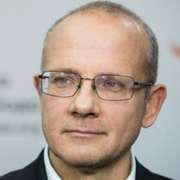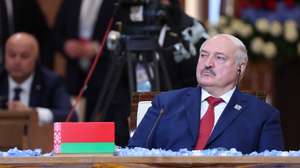One of the favorite protagonists in investigations of the deeper sources of Moscow’s recent foreign policies is the flamboyant Russian ideologue Aleksandr Dugin. Equipped with a long beard, sonorous voice, and extroverted personality, Dugin is a telegenic speaker who easily checks the box of an archetypical Russian philosopher. He can be different things to his various audiences – a modern Dostoevsky, a right-wing Trotsky, an Orthodox monk, a second Rasputin, or an alternative Tolstoy.
Dugin is an erudite polyglot who can express himself decently in several languages. He is well-read in social theory, esoteric literature, and normative philosophy. His political outlook accommodates a variety of approaches ranging from Samuel Huntington’s civilizationalism to Aleister Crowley’s Satanism, from far-left syndicalism to far-right traditionalism, from staunchly reactionary principles to expressly non-conformist ideas.
Dugin has been called a conservative, Marxist, imperialist, fundamentalist, geopolitician, and other things. Most of these labels are, in one way or another, apt yet by themselves also imprecise. When labelling his own ideology, Dugin invents new constructs like “Neo-Eurasianism” or “Fourth Political Theory” designed to intrigue readers in Russia and beyond.
Dugin is, moreover, an engaging lecturer and interlocutor. In conferences, talk shows, and interviews, he comes across as clear-eyed, eloquent, and responsive. He frankly admits his extremely nihilistic position. Dugin openly calls for a worldwide anti-liberal revolution, constantly predicts the end of international order, and readily explains his total disgust for the West.
In the 1990s, Dugin even presented himself unashamedly as a fascist. He repeatedly praised representatives of German Nazism and its allies. Recently though, Dugin has refrained from publicly expressing his sympathy for historical European fascism. He poses now instead as an “anti-fascist.”
Dugin’s and his various think-tanks’ output of texts over the last 35 years has been enormous. Dugin & Co. have published dozens of books in various languages, written hundreds of articles, and made thousands of statements in written, audio or video format, in wide variety of Russian and non-Russian media outlets, public venues, and social networks. The extraordinary volume, multiple translations, and staggering quantity of Dugin’s statements – rather than their limited depth, questionable quality, and bizarre claims – have made him famous.
Dugin is now perceived across the world as one of the most noteworthy representatives of contemporary Russian political thought. His publicistic omnipresence, bellicist discourse, and rhetorical skills have led many observers to see him as a or even the mastermind behind the resurgence of Russian imperialism and Moscow’s anti-Western turn. During the last 15 years, Dugin has been labelled as, among others, “Putin’s brain” and the world’s “most dangerous philosopher”.
Yet, Dugin’s role in inspiring the Kremlin’s new aggressiveness, in general, and the Russo-Ukrainian War, in particular, is complicated. In contrast to how he is often portrayed, Dugin is neither a philosopher of intellectual novelty nor an ideologue with direct access to the Kremlin. He likes to pose as both and is promoted as a deep thinker with links to the Kremlin by his Russian and non-Russian followers. Oddly, some of his critics too take these claims at face value.
Dugin’s philosophical pronouncements and political ideas are, however, merely Russian translations or reformulations of various older non-Russian anti-rational and anti-individualistic philosophical discourses. Whoever is familiar with classical geopolitics, integral traditionalism, international occultism, the German Conservative Revolution, French post-Modernism, European New Right, as well as some other alternative schools of thought will experience constant de ja vu when listening to Dugin.
Readers not familiar with the exalted concepts of Dugin’s inspirers of the pre-, inter- and post-war periods may perceive him as an original Russian philosopher. Yet, what he proclaims as his specifically “neo-Eurasian” or “fourth” theory is largely copy-pasted from disputed or/and marginal theorists and philosophers of the hated West. Dugin’s hodgepodge of nihilistic fantasies, fascist dreams, and totalitarian plans contains little new for students of non-Russian ultra-nationalism, anti-democratism, and illiberalism.
A somewhat similar deception exists with regard to Dugin’s frequently alleged influence on Russian political decision-making. To be sure, some of the people around Vladimir Putin, like his long time KGB associates Viktor Cherkesov and Vladimir Yakunin, have shown documented interest in Dugin’s writings.
In an interview, Putin’s notorious second-in-command, Security Council Secretary Nikolai Patrushev, once referred to the geopolitical ideas of Sir Halford Mackinder. Patrushev may have learnt about the British geographer via Dugin who popularized the disputed Western scholar in Russia in the 1990s. Mackinder had asserted, in the early 20th century, that whoever controls the world’s so-called “heartland,” i. e. roughly the Russian Federation’s today territory, will rule the world.
In the past, some of Dugin’s most extreme statements previewed today’s rhetoric of the Kremlin’s propagandists. In 2014, Dugin called, in an infamous video presentation, on Russians to “kill, kill, kill” Ukrainians. In 2015, he asserted “war is our homeland, our element, our natural and native environment, in which we must learn to exist effectively and victoriously.” Other older statements by Dugin appeared, at their time, as outrageous too, yet sound much less surprising any more today.
Nevertheless, the increasing congruence between the philosopher’s discourse and the Kremlin’s rhetoric, especially since 2022, should not be over-interpreted. This growing closeness is manifest, yet insufficient to claim a straightforward causality between Duginist ideas and Putinist policies. Dugin the last decades, Dugin has proven to have had a better pre-sentiment where post-Soviet Russia is going than many academic researchers. He has been a prophet rather than instigator of these tendencies.
What Dugin and his followers have contributed to, since the 1990s, is an increasing poisoning of Russian media and intellectual discourse with Manichean, conspirological, and eschatological ideas. Their stories about an age-old Western enmity towards Russia, inevitable final battle between the traditional land and liberal sea powers, alleged subversion of Russian society by evil foreign forces, etc. have indirectly contributed to the radicalization of Putin’s regime and policies. In doing so, Dugin and his followers have been assisted by dozens of other reactionary, fascist, racist, and ultra-nationalist Russian writers and commentators.
Together, they have performed something similar to what the German so-called Conservative Revolution did during the Weimar Republic of the inter-war period. Rather than influencing parties, politicians, bureaucrats, and diplomats directly, they have created an atmosphere in which violent internal repression and armed external aggression seem natural. Only few Russian decision-makers repeat Dugin’s ideas verbatim and even fewer have read his books, to be sure; and, given Dugin’s earlier affirmations of fascism, only select Russian official would admit being impressed by him.
Notwithstanding, the Russian extreme right, as a whole, was able to make a crucial contribution to Russia’s anti-Western turn in 2007, intrusion into Ukraine in 2014, and large-scale aggression in 2022. Dugin and similar right-wing drummers have relentlessly voiced openly imperialistic, radically nationalistic, and paranoid anti-Western ideas over more than three decades. When Putin announced his turn against the West 15 years ago, annexed Crimea almost 10 years ago, and started a large war nearly two years ago, many Russians did not need to be explained why Moscow supposedly had to do so. Russia’s extreme right, with Dugin as its philosophical patriarch, had already done so.











